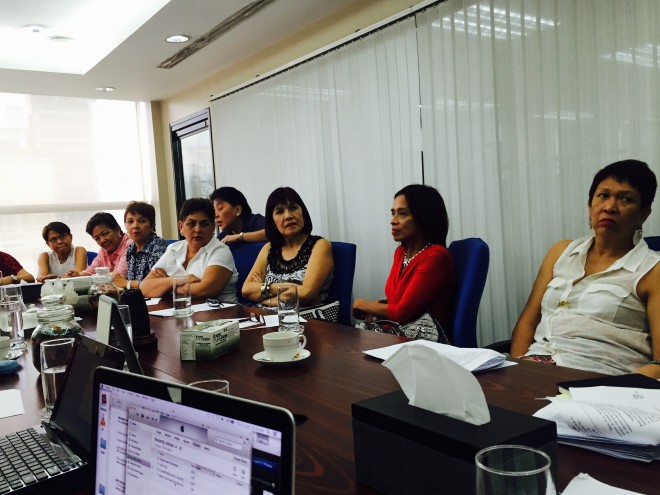
Retired flight attendants of Philippine Airlines share their sentiments on the flag carrier’s discriminatory policy. YUJI GONZALES
After 11 years of legal ping pong, retired female flight attendants of Philippine Airlines (PAL) won their gender discrimination case against the flag carrier following a favorable decision by a Makati regional trial court on May 22.
Judge Winlove Dumayas of Makati RTC Branch 39 ruled in favor of several female flight attendants of the Flight Attendants and Stewards Association of the Philippines (Fasap), declaring as “null and void” a discriminatory provision of the 2000-2005 PAL-Fasap collective bargaining agreement (CBA).
The said provision set a compulsory retirement age of 55 for females, five years earlier than the mandatory retirement age of 60 for male flight attendants.
In addition to violations in the labor code, the decision said PAL violated Section 14, Article II of the 1987 Constitution, which stated that “the State recognizes the role of women in nation-building and shall ensure the fundamental equality before the law of women and men.”
In a press conference, Lorna Kapunan, legal counsel of the female flight attendants who filed the suit in July 2004, said it was PAL’s intention to compel her clients to retire early.
“I hope there won’t be delaying tactics [on PAL’s side],” she said while lauding the decision, adding the airlines could still file a motion for reconsideration.
Kapunan said the case was tossed from the lower court to the Court of Appeals, the Supreme Court and back to the Makati court after PAL questioned the jurisdiction of the RTC to preside over what it said was a labor claim. The Supreme Court ruled on Dec. 16, 2009, that the case be sent back to the Makati RTC.
“Why does the airline think that they have to be filed a suit against before they comply?” Kapunan said.
Equality in workplace
PAL was ordered to pay the petitioners and all other flight attendants covered by the CBA damages amounting to P100,000 for each petitioner and P200,000 as attorney’s fee. Kapunan said there were about 1,000 flight attendants affected by the suit.
“They spend so much money to buy expensive aircraft but they can’t even spend to protect their human resources,” Kapunan added.
Echoing the lawyer’s sentiments, Patricia Halaguena, one of the petitioners, said she was hoping that PAL would not “further delay” the case.
“Aside from getting the favorable decision from the court, a lot of Filipino women will benefit from this landmark case,” she said, adding that championing equality in the workplace was more important than the money they would receive.
Female flight attendants said the compulsory retirement affected them financially and emotionally, as they were “too young to retire and too old to get another job.”
“There was so much anxiety within us,” said Dolores Paras, who admitted she had depression.
“They lost all their medical benefits but the male attendants who were still allowed to work get to have all the benefits the female flight crews and attendants used to enjoy,” the decision added.
The petitioners also shared that PAL used to implement a mandatory maternity leave without pay policy, decreasing the days of unpaid leave from their years of service and thus affecting their retirement pay.
“This is a huge victory and it belongs to everyone who has been a victim of discrimination,” Kapunan said. RC